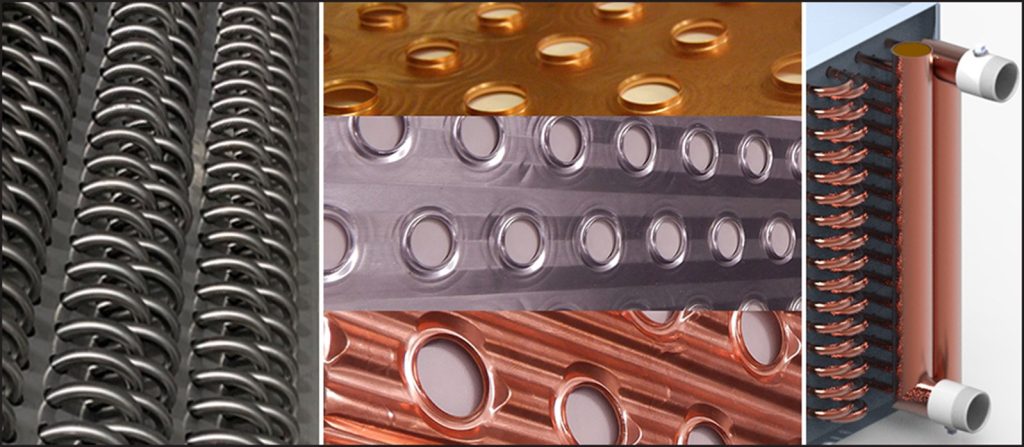
Many factors go into determining to best possible materials for each component of a coil, depending, of course, on the application. Most commercial heating and cooling coils are constructed with copper tubes and headers, with aluminum fins, in a steel casing.
However, many other options are available, and the pros and cons of each material must be considered carefully for each individual coil, depending on its specific use and environment. The Marlo engineering team has extensive experience in designing coils using a wide range of metals, and can help assure that each component is optimized for your particular application.
Custom manufacturing allows for customized materials
Manufacturers that sell “off the shelf” coils can’t possibly stock coils in all the different possible material combinations. But as a custom coil manufacturer, we are able to construct each component from any of a wide range of materials, in addition to the common copper, aluminum and steel. We have experience using a number of “non-standard” metals, including steel, stainless steel, copper/nickel, black iron and others.
Under normal circumstances for use in commercial buildings, the combination of copper tubes and aluminum fins provide the best heat transfer efficiency for the cost. While copper is more than 1.5 times more effective at heat transfer than aluminum, it is also usually about twice the cost. So even though copper fins increase heat transfer, they typically do not justify the increased cost.
Stainless steel is another material we often work with, which offers maximum corrosion resistance and can withstand high temperatures and pressures. These features make it an ideal material for coils going into specialized industrial process applications, particularly in high temperature and/or corrosive environments. However, as with every material, there are always tradeoffs. Stainless steel is not only more expensive, but also provides lower thermal conductivity. Reduced thermal conductivity means that for a given coil size, a stainless steel coil will not provide the same temperature change to the incoming air as a coil made from copper tubes and aluminum fins.
For demanding industrial process heating and cooling applications that don’t require stainless steel – but do have higher than normal temperatures and pressures – we also offer copper, aluminum and steel in special grades and thicknesses to stand up to rugged demands.
The most common materials used for the main coil components are listed below.
Tubes
The material used for a coil’s tubes depends on the type of coil and what will be flowing through it. Standard water and steam coils typically use copper tubes, but aluminum or stainless steel tubing can be used when needed. In the case of refrigerant coils, the type of refrigerant used will often dictate the tube material, particularly refrigerants that operate under extreme pressure, such as ammonia, which requires stainless steel tubes for their strength and durability. In addition, certain types of chemicals require aluminum tubes and high temperatures often require stainless steel.
Fins
Most commonly made of aluminum, fins can also be made from copper for added heat transfer capabilities and anti-microbial properties. In addition, stainless steel fins are ideal for corrosive environments or when extra durability is required. For example, many of the coils we manufacture for U.S. Navy vessels include copper fins. We also offer different fin patterns to meet individual needs.
Headers
The headers on coils are normally made of the same material as the tubes, with copper being the most common. For high-pressure steam coils – and other coils that operate under extreme pressures – welded stainless steel box headers are used to provide added strength. Other metals sometimes used for headers include steel and copper/nickel. In addition, most of our coils feature black iron threaded fittings, which are brazed onto the header connection stubs. We also routinely provide connections in red brass for applications where it is required.
Casings
Our casings are typically made of heavy-gauge galvanized steel or stainless steel. Casings/housings can be fully welded to be airtight when cross contamination of airstreams must be prevented.
While the options and combinations of coil materials may seem overwhelming, rest assured that the Marlo engineering team will choose the ideal material for each and every component of your custom coil, based on the requirements of your individual application. To discuss your needs, just contact your local Marlo representative.
Email Registration
Please complete the form below to sign up for our news alerts and other email communications.
"*" indicates required fields